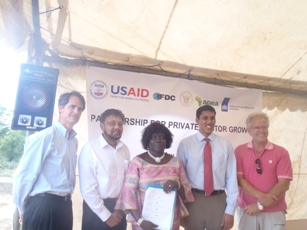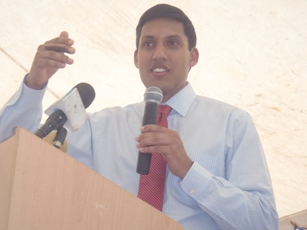USAID and Netherlands boost S. Sudan’s private sector
By Julius N. Uma
May 6, 2011 (JUBA) – South Sudan’s private sector on Friday received a major uplift, courtesy of a communiqué jointly signed by a consortium of development partners, consisting of the US Agency for International Development (USAID), the Netherlands, Alliance for a Green Revolution in Africa (AGRA) and the International Fertilizer Development Center (IFDC).

Rajiv Shah, the USAID administrator, Robert van Lanschot, the Netherlands first secretary in South Sudan, Jim Bromley, AGRA’s chief operating officer and Amit H. Roy, the IFDC President and CEO signed the document, which was witnessed by Ann Itto, South Sudan’s Agriculture and Forestry minister.
“The parties listed (hereinafter referred to as the “Parties”) do hereby declare the intentions to support the Government of Southern in their efforts to transform farms into businesses,” party reads the May 6 communiqué.
Itto said the need to improve food security in each household remains a priority for the government but said it would only be achievable through improved agricultural productivity. The government, she said, intends to ensure that agricultural productivity increases from 0.5 metric tons per each household to 1.2 metric tons as feasible mechanisms for achieving food security.
“The government of South Sudan is currently focusing on rural transformation and development to boost food security among the population. But to achieve this, we need embark on a broad-based economic strategy that encompasses all sector of our economy,” she remarked.
The minister, however, lauded the U.S. government for its continued support towards South Sudan, saying its involvement recently concluded self-determination referendum proved to be an important milestone for southerners who overwhelmingly voted for separation.

The USAID administrator said that as well as increasing agricultural productivity not only improves food security but also reduces poverty through the increase in Gross Domestic Product (GDP).
“Any effort to transform agriculture has to be competitive in nature. This should involve the use of modern technology, improved seeds and fertilizers for better yields,” Shah said.
The U.S. government, he assured, remains committed towards improving the private sector in South Sudan. USAID’s private sector growth support initiative, he added, will mainly target small household women farmers.
He urged the southern government to ensure that funds allocated for improving agriculture in the region fully serve their intended purposes and warned against the misuse of grants donated by the U.S. government.
Over the years, USAID has reportedly provided tremendous assistance to support private sector development in South Sudan, investing in critical infrastructure, support to agriculture, and assistance to the southern land commission especially land policies. USAID have also helped the Bank of south Sudan develop banking operations and supervision responsibilities.
(ST)
